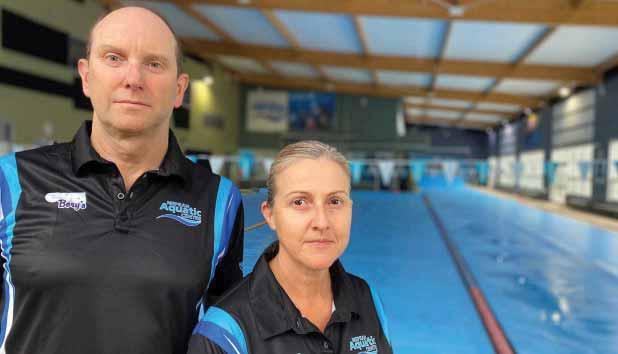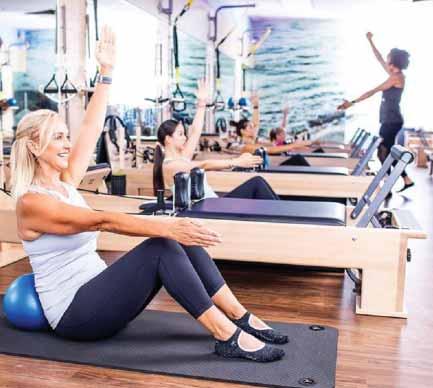
8 minute read
Learn to Swim Service is Essential
Nepean Swim & Fitness.
With swim schools facing permanent closure, Karen Bentley calls for learn-to-swim services to be classed as an essential service
Advertisement
It’s time for swim schools to be reclassified as an essential service to reduce drownings and keep Australian children safer.
Drowning remains the number one cause of accidental death among children aged five years and under in Australia and I believe that this tragic statistic will not improve with swim schools across the country having been repeatedly closed during Coronavirus lockdowns.
With swim schools across the nation not classed as an essential service, thousands of Australian children have missed out on learning this crucial lifesaving skill over the past 16 months.
Bentley also advised that despite a 100% decrease in income during lockdown, swim schools are struggling to obtain government assistance, threatening their ability to reopen after lockdown.
While there are a number of important drowning prevention initiatives, learning to swim is by far the primary driver to control our national drowning statistics.
Swim safety is achieved by skill repetition, and crucial swimming skills learnt are lost without practice. 12 children aged 0-4 years drowned in Australia in 2019/20, a 37% decrease on the previous year (and) we are very concerned that repeated lockdowns will have a tragic influence on these figures.
You only have to look at what happened last year in Victoria - following multiple lockdowns, Victoria reported a record number of drownings from July to December.
I believe that swim schools should be recognised as an essential educational facility and should be treated the same way as pre-school and other educational institutions.
Furthermore, swim schools should be exempt from the payroll limit rendering us ineligible for government assistance during lockdown, in the same way that tourism, accommodation and hospitality are exempt - at least cafes and restaurants can serve takeaway, whereas we are unable to trade at all.
It just doesn’t seem right. And we are not alone - many local businesses face the same difficulties - (but) the exemptions seem pretty arbitrary.
While swim schools have been closed in lockdown, despite the proven safety of the indoor learn-to-swim centre environment, other early learning settings remain open.
This is shown by a recent study from the UK’s Imperial College which identified that chlorine deactivates the Coronavirus in 30 seconds and a US study of over 300,000 patrons of indoor swimming pools that reported zero incidents of COVID-19 infections in the aquatic environment.
It’s frustrating and inconsistent that you can take your child to preschool, daycare, vacation care, Woolworths, JB Hi-Fi and Bunnings during lockdown, but you can’t bring them to small learn to swim classes in an environment that has been proven safe multiple times both here and overseas, with defined learnto-swim class times ensuring limited occupancy.
We too have COVIDSafety plans, QR code check in and socially distancing measures in place, so we can also record the visit data as mandated, whilst delivering a lifesaving skill.
With swim schools across the country in a difficult financial position, Terry Spinks, Operations Manager at Nepean Swim and Fitness, commented “unfortunately, the long term prognosis for swim schools isn’t looking good.
“Most are small ‘Mum and Dad’ businesses who have been hit hard by Covid and are only just beginning to recover. During lockdown we earn zero income and given the nature of our business will still incur significant costs whilst closed, but we are not eligible for any financial assistance from the NSW government during this recent lockdown.”

Terry Spinks (left) and Karen Bentley of Nepean Swim & Fitness.
The Imperial College study by leading UK virologist and expert in respiratory viruses from the Department of Infectious Disease, Professor Wendy Barclay, found that swimming pool water can inactivate the COVID-19 virus in only 30 seconds.
Professor Barclay explained “by mixing the virus with swimming pool water …. we could show that the virus does not survive in swimming pool water: it was no longer infectious. That, coupled with the huge dilution factor of virus that might find its way into a swimming pool from an infected person, suggests the chance of contracting COVID-19 from swimming pool water is negligible.”
Furthermore, the US study conducted by the New Jersey Swim Safety Alliance reported that despite over 300,000 people attending the 60 facilities studied since reopening after the US lockdown, zero people were infected in those facilities. The study further suggested that aquatic facilities may be particularly safe environments due to “droplets being carried away from swimmers in warm, humid air”, and the fact that “COVID-19 droplets falling into the water are neutralised by chlorine”. Furthermore, the study found that ‘when a swimmer vigorously exhales, it is nearly always with their face in the water.”
In a recent report prepared for Swimming Victoria, Australian Elite Swimming Coach Joanne Love, Director of Proactive Performance Australia noted “today’s pools are sophisticated facilities with operating plants, filtration and water quality systems, and environmental air controls.
“However, from outdated information based on pools of the past, there is a misconception from the general public and at times, medical professionals, who mistakenly ascribe pools to be the contributor to the spread of illnesses.
“Swimming pools are highly regulated and controlled environments, with strict mandated operational and water quality guidelines (and) the majority of today’s pool facilities operate automatic systems, where water quality can be tested and adjusted every two minutes.
“These disinfection systems ensure a safe environment which inhibits the spread of bacterial germs and viruses.”
Love’s research concluded that “based on the evidence provided in recent studies, the current water quality operations of swimming pools meet the requirements to eliminate transmission (if it occurs) in swimming pool water.”
Love’s research also affirms that planning and management of aquatic programs is important in preventing infection, stating “this is in line with structured programs such as learn to swim, squad swimming and supervised rehabilitation programs, which can maintain close supervision of physical distancing, up to date contact details and the continued preservation of the hygienic environment.”
The current NSW Public Health Order (Division 4 - paragraph 24) states that “nothing in this clause prevents the use of premises to (a) to provide a service to assist vulnerable members of the public…and (b) as an early education and care facility.”
Alan Bentley, also a Director of Nepean Swim and Fitness explains “this clause is particularly relevant to the learn to swim industry - the majority of our facilities patrons are young children learning to swim, including children with special needs, and people of all ages requiring the water for physical rehabilitation.
“Surely these people can all be classed as vulnerable, and our services classified as education and care? Children are vulnerable if they cannot swim.
“We are not requesting special treatment or looking for any kind of loophole to operate within what we understand is an incredibly serious pandemic, we just want a level playing field and fair consideration of our unique industry and environment. We are strongly recommending to government that we are reclassified as an essential educational facility so that we can continue to deliver this vital service to the community in a safe and controlled environment without further shutdown periods to prevent even more lessons being missed.
“We also ask that the payroll limit exemption to be eligible for the current NSW government assistance is extended to include swim schools. Our swim school has thrived locally for 30 years previous to COVID, but along with hundreds of other swim schools nationally we potentially run the risk of not being able to reopen our doors, depriving thousands of local children of lifesaving swim safety education, and many local residents of employment.”
Spinks added “I call on the government to reclassify us as an essential educational service - the irony is we are classified as such for GST purposes, so it is simply an extension of that classification. However, despite an abundance of international research to support our case, our request for consideration seems to be falling on deaf ears. This could have dire consequences for the children of NSW and across the country, many of whom already are not hitting their age appropriate swimming milestones.” Karen Bentley is Director of Nepean Swim & Fitness in the western Sydney suburb of Penrith.
Rackley Swimming opens new facility in Yamanto Central retail development
Rackley Swimming has opened its latest swim school in the Yamanto Central retail development in south east Queensland. Rackley Swimming Yamanto is the group’s 27th site located across south east Queensland, with two heated Learn to Swim pools adjacent to other consumer-centric retail offerings within the new Yamanto Central shopping mall.
Rackley Swimming General Manager, Cameron Speechley says the centre is the “pinnacle” of more than 20 years’ experience providing local families quality swimming lessons, commenting “this centre is designed around the ultimate focus on the customer. From climate-controlled pool areas, airconditioned viewing areas, child’s play area, and swim shop, children and parents will receive a best in class experience, all while enjoying the benefits of swimming.”
The purpose-built facility is Rackley Swimming’s fourth shopping centre swim school site, following a shift to nontraditional retail settings in developing areas.
Advising that the launch will particularly benefit those who have fallen behind in swimming progression due to COVID lockdowns and restrictions closing centres in 2020, Rackley Swimming Chief Executive, Reece Rackley, noted “ensuring the community has a revitalised and first-class facility to enjoy healthy, active lifestyles is at the core of our business and after many families missed out on lessons last year due to the pandemic, the facility could not have arrived at a better time.
“We could not pick a better location and neighbourhood to expand our family swim school.”
With retail locations increasingly looking at diverse leisure offering to attracts not only shoppers but other consumer visits, Yamanto Central also features two Viva Leisure fitness facilities - a Club Lime gym and a hiit republic studio.
Yamanto Central is located 45 kilometres south west of central Brisbane.











